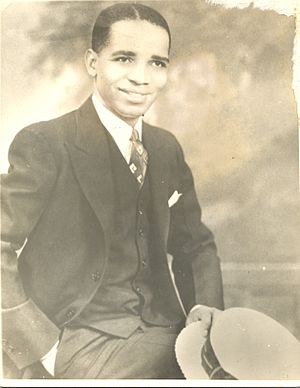Hastings Banda facts for kids
Quick facts for kids
His Excellency Ngwazi
Hastings Kamuzu Banda
|
|
|---|---|
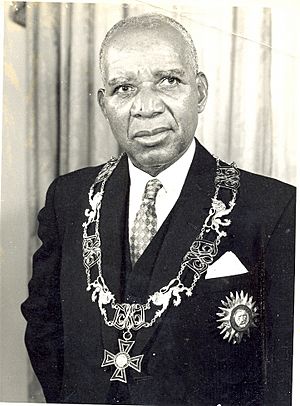
Portrait of Hastings Kamuzu Banda
|
|
| 1st President of Malawi | |
| In office 6 July 1966 – 24 May 1994 |
|
| Preceded by | Elizabeth II as Queen of Malawi |
| Succeeded by | Bakili Muluzi |
| Prime Minister of Malawi | |
| In office 6 July 1964 – 6 July 1966 |
|
| Monarch | Elizabeth II |
| Governor-General | Sir Glyn Smallwood Jones |
| Preceded by | Post established |
| Succeeded by | Himself as President |
| Personal details | |
| Born |
Akim Kamnkhwala Mtunthama Banda
c. 1898 Kasungu, British Central Africa (now Kasungu, Malawi) |
| Died | 25 November 1997 (aged 99) Johannesburg, Gauteng, South Africa |
| Political party | Malawi Congress Party |
| Alma mater | University of Chicago Central State University Indiana University Meharry Medical College University of Edinburgh |
| Religion | Presbyterian (Church of Scotland) |
Hastings Kamuzu Banda (born around 1898 – died 25 November 1997) was a very important leader in Malawi. He served as the Prime Minister and later the President of Malawi from 1964 to 1994.
He helped Malawi gain its independence from the United Kingdom. In 1966, Malawi became a republic, and he became its first president.
Banda studied a lot overseas, learning about different cultures, languages, history, and medicine. When he returned to his home country, then called Nyasaland, he spoke out against colonialism. He wanted his country to be free. He led Nyasaland to independence in 1964.
Two years later, he made Malawi a republic and became its first president. He became a very strong leader and made Malawi a one-party state under his political group, the Malawi Congress Party (MCP). In 1970, the MCP named him their leader for life. The next year, he became President for Life of Malawi. He was known for being against communism and received support from Western countries during the Cold War.
Banda supported women's rights, improved the country's infrastructure (like roads), and kept a good education system compared to other African countries. However, his rule was very strict. He faced pressure from inside Malawi and from other countries to change his government. In 1993, he agreed to hold a vote, which led to the end of the one-party system. Soon after, his title of President for Life was removed, and he lost most of his power. Banda ran for president in the next elections in 1994 but was defeated. He passed away in South Africa in 1997.
Contents
Early Life and Education
Kamuzu Banda was born Akim Kamnkhwala Mtunthama Banda near Kasungu in Malawi. At that time, the country was called British Central Africa. His exact birth date is not known because birth records were not kept back then. Banda often said he was born on 14 May 1906. However, later evidence suggested he was born around March or April 1898.
He left his village school and went to Chayamba Primary School. In 1908, he moved to a mission station and was baptized in 1910. His original name, Kamnkhwala, meant "little medicine." It was changed to Kamuzu, meaning "little root." This name was given because his mother had used root herbs to help her have children before he was born. He chose the Christian name Hastings after a Scottish missionary he admired. The title "doctor" came from his medical education.
Around 1915–1916, Banda traveled on foot with his uncle to Southern Rhodesia (now Zimbabwe). He wanted to study at a famous missionary school in South Africa but finished his basic education without attending it. In 1917, he walked to Johannesburg, South Africa. He worked in a mine for several years. There, he met Bishop William Tecumseh Vernon, who offered to pay for his studies in the United States if Banda could pay for his trip there. In 1925, he left for New York.
Life Abroad (1925–1958)
Studying in the United States
Banda studied at the high school part of Wilberforce Institute in Ohio, graduating in 1928. He then enrolled as a pre-medical student at Indiana University. He later transferred to the University of Chicago. While there, he worked with an anthropologist and linguist, providing information about his native Chewa language. This helped create a grammar book for the language. He earned a degree in philosophy in 1931.
He received financial help from different people to continue his education. He then studied medicine at Meharry Medical College in Tennessee, earning his medical degree in 1937. Banda was one of the first people from Malawi to become a doctor.
Medical Practice in the United Kingdom
To practice medicine in British territories, Banda needed another medical degree. He attended the University of Edinburgh in Scotland and received a medical diploma in 1941. His studies were supported by the government of Nyasaland and the Church of Scotland.
From 1941 to 1945, he worked as a doctor in North Shields, England. After World War II, he opened his own practice in London. He also became involved in politics, joining the Labour Party.
In 1945, he represented the Nyasaland African Congress at a big meeting in Manchester. From then on, he became very interested in his home country. He advised the Congress and helped them financially. He also worked in London to support their cause.
Opposing the Federation
Banda strongly opposed the idea of forming a federation (a union) between Southern Rhodesia, Northern Rhodesia, and Nyasaland. He worried this would take away more rights from black people in Nyasaland. This federation was formed in 1953, but Banda called it "stupid."
There were rumors that he would return to Nyasaland in 1951, but he moved to the Gold Coast (now Ghana) in West Africa instead.
Returning Home to Lead
Several important leaders from the Nyasaland African Congress asked Banda to come back and lead their fight for independence. After some delays, Banda finally returned to Nyasaland on 6 July 1958, after being away for about 42 years. In August, he was chosen as the leader of the Congress.
Leading Malawi to Independence
Banda began traveling around the country, speaking against the Central African Federation. He encouraged people to join his party. He was welcomed with great excitement everywhere he spoke. Resistance to colonial rule grew stronger among Malawians. By February 1959, the situation was serious, and troops were brought in. On 3 March, Banda and many other Africans were arrested. He was sent to prison in Southern Rhodesia (now Zimbabwe).
Release and Path to Freedom
Meanwhile, in Britain, there was a growing desire to end colonial rule. Banda was released from prison in April 1960. He was soon invited to London for talks about gaining independence. Elections were held in August 1961. Banda became the unofficial Prime Minister of Nyasaland, a title he officially received on 1 February 1963. He and his ministers quickly improved secondary education, changed old colonial courts, and made other important reforms. In December 1962, Britain agreed to end the Federation.
Banda himself chose the name "Malawi" for the country. He had seen it on an old map as "Lake Maravi" and liked the sound. On 6 July 1964, exactly six years after Banda returned, Nyasaland became independent and was renamed Malawi.
Leader of Malawi
Early Challenges and Power
Just a month after independence, Malawi faced a challenge within the government. Some of Banda's ministers wanted to limit his power. Banda responded by removing four ministers, and others resigned in support of them. These former ministers then left the country.
New Government and Strong Leadership
Malawi adopted a new constitution on 6 July 1966, making the country a republic. Banda was elected as the first president for a five-year term, and he was the only candidate. The new constitution gave Banda a lot of power in both governing and making laws. It also officially made the MCP the only legal political party. However, the country had already been a one-party state since independence. This new constitution made Banda's presidency very strong.
In 1970, the MCP declared Banda their leader for life. In 1971, the government also declared him President for Life of Malawi. His full title was "His Excellency the Life President of the Republic of Malaŵi, Ngwazi Dr. Hastings Kamuzu Banda." The word Ngwazi means "chief of chiefs" or "great lion" in the Chicheŵa language.
Banda was often seen by outsiders as a kind, though unique, leader. He usually wore English-style suits and carried a walking stick. He once said about his rule, "Everything is my business. Everything. Anything I say is law...literally law." Inside Malawi, people either admired him greatly or feared him.
Foreign Relations
Against Communism
During Banda's time as president, Malawi at first did not have official relations with communist governments in Eastern Europe or Asia. However, later on, relations were started with countries like North Korea in 1982 and Romania and Albania in 1985.
Banda was one of the few African leaders who supported the United States during the Vietnam War. He did this partly because he strongly disliked communism.
Relations with Other African Nations
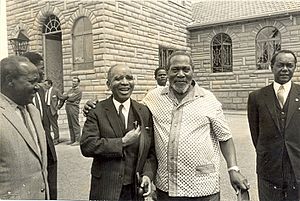
Many southern African countries traded with apartheid-era South Africa because they needed to for their economies. Malawi was the only African nation that officially recognized South Africa and had diplomatic relations with it. This included a trade agreement, which made other African leaders angry. They even threatened to remove Malawi from the Organization of African Unity. Banda argued that other African countries were not being honest. He told them to focus on convincing the South African government to end apartheid.
Relations with South Africa
Banda was the only African leader to have official ties with South Africa during apartheid. After the government changes in 1964, Banda became more isolated from other African countries. He turned to South Africa for financial help, which gave him a large loan. In return, Banda supported South Africa's apartheid policies among other African leaders. He even made a state visit to South Africa. Banda's strong anti-communism also influenced his decision to have good relations with South Africa.
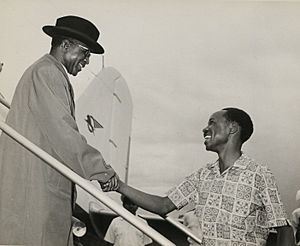
After apartheid ended in the 1990s, relations between Malawi and South Africa could have become difficult. However, a meeting was arranged between the two governments. This led to Nelson Mandela's first official visit to Malawi as president of the ANC in the early 1990s. Relations continued to be friendly, especially after it was revealed that Banda had secretly helped the ANC during the apartheid era.
Involvement in Mozambique
Banda's involvement in Mozambique began when it was a Portuguese colony. Banda supported the Portuguese colonial government and groups that worked with it. After Malawi gained independence, Banda strengthened his ties with the Portuguese government. He also worked against the Liberation Front of Mozambique (FRELIMO) forces in Malawi. The Organization of African Unity had chosen Malawi to help independence movements in Mozambique.
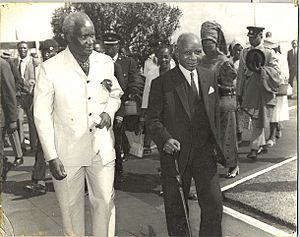
By the 1980s, Banda supported both the government and a rebel group during the Mozambique civil war. He had the Malawi Army support the Mozambican government to protect Malawi's interests. At the same time, he used the Malawi Young Pioneers to help the rebel group, RENAMO. Malawi was used to send foreign aid from South Africa's apartheid government to RENAMO. Other African leaders visited Banda to try and convince him to stop supporting RENAMO. Banda, however, wanted to protect Malawi's access to the Port of Nacala in Mozambique for trade.
Political Changes
The end of the Cold War brought big changes for Banda's strong rule. Western leaders and countries giving aid no longer supported authoritarian governments that were against communism. They told Banda that he needed to make his government more open and responsible to the people. The British government also stopped its financial support. In March 1992, Catholic bishops in Malawi wrote a letter criticizing Banda and his government. Students joined protests to support the bishops, causing universities to close.
In April 1992, Chakufwa Chihana, a union leader, openly asked for a national vote on Malawi's political future. He was arrested. By October 1992, this growing pressure from inside and outside the country forced Banda to agree to hold a vote. The vote was held on 14 June 1993. Most people (64 percent) voted for a system with many political parties. After this, new political parties were formed, and preparations for general elections began. Banda worked with the new parties and did not object when a special meeting removed his title of President for Life and most of his powers. The change from a very strict government to a democracy was quite peaceful.
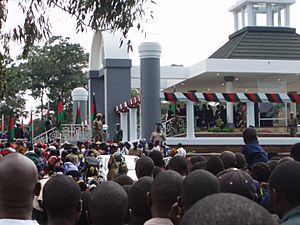
"Operation Bwezani" was a Malawi Army operation in December 1993 to disarm the Malawi Young Pioneers. "Bwezani" means "give back." The Young Pioneers were Banda's personal security guards and were trained in his ideas and military skills. The Malawi Army acted after protests from the people.
After some health concerns, Banda ran in Malawi's first truly democratic presidential election in 1994. He was defeated by Bakili Muluzi. Banda quickly accepted his defeat. He said on state radio, "I wish to congratulate him wholeheartedly and offer him my full support and cooperation." This marked the end of Malawi's 30 years of one-party rule.
The Malawi Congress Party, which Banda had led since 1960, remains an important political force in Malawi.
Life in Banda's Malawi
Party Membership
All adult citizens were required to be members of the MCP. People had to carry their party cards at all times. Police would often stop people and ask to see their cards. These cards were sold, sometimes even to unborn children.
Malawi Young Pioneers
The Malawi Young Pioneers were a special group within the MCP. They were used to control and sometimes frighten the public. The Pioneers carried weapons, gathered information, and were Banda's trusted bodyguards. They helped create a feeling of fear during his rule.
Strong Public Image
Banda was the subject of a very strong public image. Every business building had to display an official picture of him. No other poster or picture could be placed higher than his portrait. Before every movie in cinemas, a video of Banda waving to the people was shown while the national anthem played. When Banda visited a city, groups of women were expected to greet him at the airport and dance for him. A special cloth, with the president's picture on it, was required for these performances. Places of worship needed government approval to operate, and some religions were completely banned.
Controlling Information
All films shown in cinemas were first checked by the Malawi Censorship Board and edited. Videotapes also had to be sent to the Board. Once approved, the film received a sticker saying it was suitable for viewing. Books and magazines were also edited. Pages, or parts of pages, were cut out of magazines. Certain types of literature were banned. The mass media, including a single radio station and newspapers, were tightly controlled. They mainly served to spread government messages. Knowledge of history before Banda's rule was discouraged, and many books on these topics were burned. Foreigners who broke these rules were often deported.
Dress Code and Rules
His government closely watched how people lived. Early in his rule, Banda created a dress code based on his traditional views. Women were not allowed to wear trousers or skirts that were above the knee. The only exceptions were at private resorts where the public could not see them. Banda said these rules were to show respect for women. Men's hair had to be short, no longer than collar length. Foreign visitors arriving at the airport sometimes had to get mandatory haircuts if their hair was too long.
Supporting Women
Banda founded Chitukuko Cha Amai m'Malawi (CCAM) to help women in Malawi. This organization encouraged women to do well in education and government. It also motivated them to be more active in their communities, churches, and families. The official hostess for the former president, Cecilia Kadzamira, was the National Advisor for this foundation.
Building the Country
In 1964, Banda started a plan to speed up economic development in Malawi. He wanted Malawi to produce its own goods and services, becoming less reliant on other countries. A big program to build infrastructure was started. Much of this development was funded by the Agricultural Development and Marketing Corporation (ADMARC). This organization was created to help Malawi's economy by increasing agricultural exports.
The country's infrastructure improved with many new roads. When the capital city was moved from Zomba to Lilongwe, a new road was built connecting Blantyre and Zomba to Lilongwe. The Capital City Development Corporation (CCDC) in Lilongwe was very busy building roads and government buildings. Other infrastructure projects included new hotels. Industrial companies were also set up. These efforts led to an economic boom in the mid-to-late 1970s.
However, by 1979–1980, the economy faced challenges due to a global economic crisis. Rising oil prices and falling prices for goods hurt Malawi's economy.
Banda personally founded Kamuzu Academy, a school similar to Eton College in England. At this school, Malawian children were taught Latin and Greek by foreign teachers. Many students from this school have become leaders in medicine, education, and business in Malawi and other countries. Banda said he wanted Malawian children to get a good education without having to travel abroad.
Wealth
It is believed that during his time as leader, Banda gathered at least US$320 million in personal wealth. This money was thought to be invested in various businesses, from farming to mining, especially in South Africa.
Personal Life
Banda had no known children. He was not married when he passed away. Cecilia Kadzamira was the official hostess or first lady of Malawi. She played a very important role in the country during Banda's later years.
In 2010, a man named Jumani Johansson (1973–2019) claimed to be Banda's son and asked for DNA testing through the courts in Malawi.
Death and Legacy
Banda passed away at the Garden City Clinic in Johannesburg, South Africa, on 25 November 1997, due to breathing problems. Although the clinic recorded his age as 99, government officials believed he was closer to 90 years old.
He was buried with a grand ceremony. Years after his death, people called for a more significant memorial for Malawi's first president. Construction of a mausoleum, which also included a library and a dancing area, began in 2005. It was finished in 2009 at a cost of US$600,000. The mausoleum is made of marble and granite. Its four main pillars represent Banda's key principles: unity, loyalty, obedience, and discipline. In 2009, a bronze statue of Banda was also put up.
From 10 April 1995, when former Prime Minister of India Morarji Desai died, Banda was the world's oldest living former head of government until his own death in 1997.
|
See also
 In Spanish: Hastings Kamuzu Banda para niños
In Spanish: Hastings Kamuzu Banda para niños
- President of Malawi
- Similar protests under his rule:
- 1992–1993 Malawian protests that led to his departure in 1994
 | Janet Taylor Pickett |
 | Synthia Saint James |
 | Howardena Pindell |
 | Faith Ringgold |


